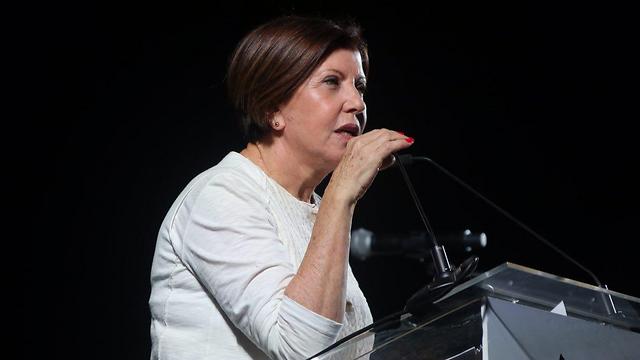

Women seeking sterilization asked by hospital for rabbi's approval
Hospitals that declare themselves as religious institutions are asking women who seek to undergo sterilization to ask permission from the hospital's rabbi, while Arab women are sometimes denied altogether—in violation of medical ethics and the law.
Women who seek to undergo a tubectomy in a hospital that declares itself a religious institution will find that even if they have a doctor's approval, they will still need the permission of the hospital's rabbi—unless they are Arab, in which case the hospital might deny them the procedure altogether.
Tubectomy, or Tubal ligation, is a surgical procedure for sterilization in which a woman's fallopian tubes are clamped or severed. According to Halacha, this procedure is considered castration and is prohibited, except for life-threatening medical reasons.
In both Laniado Hospital in Netanya and Mayanei Hayeshua Hospital in Bnei Brak, officials told women who called on behalf of Ynet and expressed interest in the procedure that they will have to seek the permission of the hospital Rabbi.
Furthermore, when they called and indentified as Arab, Mayanei Hayeshua Hospital still requested them to contact the rabbi for permission, while Laniado Hospital told the woman that she cannot undergo the procedure at the hospital.
Laniado Hospital serves many residents of the Triangle and is one of the two main hospitals serving the residents of Qalansawe, Tayibe and Tira (the other one being Meir Hospital in Kfar Saba).
Although both hospitals rely on donation funds from Ultra-Orthodox organizations, both are state-funded, and as such are obligated to provide equal medical treatment to all Israeli citizens. Additionally, Interference with medical considerations for religious reasons is illegal.
"A physician cannot impose on a patient his religious world view, and he must present to the patient all the options that are relevant to him, whether they conform to his belief or not," said attorney and medical law expert Adi Niv-Yagoda. "A religious physician who thinks that tubal ligation is contrary to Halacha does not have to perform the procedure himself, but he is obligated to give the woman this option. Religious hospitals are no exception to this rule."
In the case of obtaining the rabbi's permission, it is not as simple as filing a request, as most woman who do so are turned down unless the procedure is imperative for their medical well-being.
A brief scroll through the forums of the religious and Ultra-Orthodox sectors sheds more light on this mindset.
In one case, a woman with serious womb-related medical issues was recommended the procedure by a doctor, who advised her not to have children and to consider tubal legation, as he said it will help with her general health. After asking the rabbi if this was allowed, he answered that no, as any form of castration is forbidden according to Halacha.
In another case, a woman expecting her fifth child said that her pregnancy was accompanied by gestational diabetes and other complications, and that since she was expected to give birth by cesarean section, and not for the first time, she was offered to undergo a tubectomy. Asking if this was permissible, the rabbi's answer was an unequivocal "No!" adding that "there is no knowing what tomorrow will bring and with God's help you will have more children."
'Medieval behavior'
MK Zahava Gal-On, Chairperson of Meretz, has long campaigned against restricting women's freedom of choice in hospitals for religious reasons. In the past, she also demanded from Health Minister Yaakov Litzman to impose sanctions on hospitals that refuse to perform abortions for religious reasons, but Litzman has yet reply to her demand.
"This is completely undermining the institutions of the state and the laws of the state," said MK Gal-On. "Hospitals that receive state funding cannot decide on political or religious agendas that ultimately guide their actions.
"In fact, there are two cases of discrimination here, one against Jewish women which violates their autonomy, as well one against Arab women who are discriminated not only as women but also as Arabs.
"This is a medieval behavior that stands in contradiction to the fact that we are an amended state of law and the fact that these hospitals receive government funding."
Following the findings of the inquiry, MK Gal-On again appealed to Minister Litzman in a letter to exhaust the proceedings before appealing to the High Court of Justice.
"We will not give up on this matter," said MK Gal-On.
A Health Ministry spokesperson commented: “We do not agree with these practices. We intend to get to the bottom of this issue as soon as possible, possibly with the ombudsman of the medical professions, to inspect the disciplinary and ethical aspects of this affair, and will act according to the findings.”
The Physicians for Human Rights organization said: "Tubal ligation is a treatment that is provided by the state as part of its universal health care, and since the women who are treated are autonomous, it is their full right to decide on their bodies and how they wish to prevent future pregnancy. This procedure is done at the hospital, and therefore it cannot be claimed that it should be performed elsewhere.
"The fact that the treatment is conditional upon the approval of a rabbi and / or spouse is a gross violation of the patient's autonomy—one of the four basic principles of medical ethics, in addition to being a violation of the Patient's Rights Law."
A spokesperson for Ma’ayane HaYeshua defended the practice: "Since tubal ligation is not a life-saving procedure and is irreversible, the hospital believes it requires reflection and so we do not perform it at the patient’s request only. We must find a clear medical reason requiring intervention and we make sure the woman in question has considered the procedure.
"If this is an ultra-Orthodox woman, the rabbi of the hospital or another rabbi she wants to consult with must be a partner in this decision. For a woman who is not Jewish, there is no requirement to consult a rabbi, but she will be evaluated by a social worker or psychologist, and we will approve the procedure only if there are reasons that justify it."
No response was given by Laniado Hospital.

















